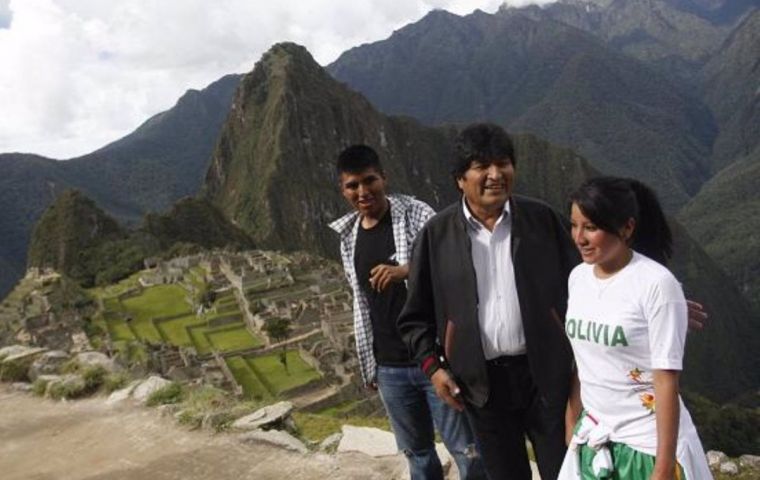MercoPress. South Atlantic News Agency
Bolivia's ruling party sets up headquarters in Peru
 A war from the late 19th Century still determines the region's future
A war from the late 19th Century still determines the region's future Just a couple of days after Peru's President Pedro Castillo Terrones lost support from his Marxist Peru Libre party, which decided not to support his new cabinet, press reports have come out indicating former Bolivian President Evo Morales's Movement Towards Socialism (MAS) has set foot into the country and even has established its headquarters in Cusco.
The city which once was the capital of the Inca empire seems to be quite befitting for nearby Bolivia, with similar weather and even altitude above sea level. And sea would explain Evo's interest in a country with a sizeable ocean coastline.
Since losing the so-called War of the Pacific (1879-1884). and with it any direct access to the Pacific Ocean, Bolivia needs to negotiate how to ship its exports. The 1904 Treaty of Peace and Friendship with Chile in 1904 provided some form of a solution but Evo insisted and in 2018 The UN's International Court of Justice based in The Hague ruled Chile was not bound to give Bolivia access to the sea in any form other than those agreed to in the 1904 document, which means Chile does not even have to guarantee Bolivia's free access to the sea.
Some estimates suggest that Bolivia's maritime seclusion damages around 47% of its export potential and landlocked countries are less likely to receive foreign direct investments. And given Chile's higher prices and increasing restrictions, Bolivia might just as well broker some sort of corridor to the sea through Peruvian territory.
In this geopolitical scenario, some letterhead documents from the Movement to Socialism (MAS) identify Cusco as the headquarters of the political party led by Evo Morales, according to a report from Peru's Panorama broadcast report. The letters were reportedly sent from Cusco to Bolivia between August and September 2021.
“We ask his distinguished authority that Brother Cecilio Máximo Ilasaca, a computer science graduate, be considered for appointment as consul in the Cusco region of the Republic of Peru,” says one of the letters.
Panorama contacted the person who signs the documents, Isabel Ara Condori, who identified herself as a representative of Bolivian MAS-IPSP residents. “This is going to expand nationwide because there are many residents in the departments here in Peru,” Ara told Panorama.
Meanwhile, Morales is also negotiating to legalize coca crops in Peru, industrialize it nationwide and the DEA as he did in Bolivia a few years ago. Morales has already proposed in 2018 the return to the Peru-Bolivian Confederation (which lost the war to Chile in the late 19th Century).
On August 12, the Arica Port Company (EPA), applied an increase to the rates of 23 services provided to Bolivian commerce. This decision was rejected by the Government of Luis Arce, which called the measure “imposition” and assured that it would not tolerate it. According to Dante Justiniano, manager of the Administration of Port Services-Bolivia (ASP-B), the recent increase “represents a frank violation of the 1904 Treaty ”, which establishes that any decision on this class of rates must be agreed bilaterally.
For several decades the Chilean ports of Arica, Iquique and Antofagasta have been the most important triad for Bolivian foreign trade, the former being the most prominent. Only in 2020, an approximate value of 6,898 million dollars in Bolivian exports left through the said port, about 18% of total exports. At the same time, 31% of Bolivian imports entered through Arica the same year. Now, the EPA decision contemplates increases of almost 200% for 40-foot containers.
With a new Peruvian president much closer ideologically to Morales' party, halting all negotiations with Chilean ports should not come as a surprise, as plans for a Plurinational America seem to gain momentum. Morales' recent tour of Peru seems to be clearer now.
Read also: Peru's ruling party diverts from proposed cabinet — MercoPress




Top Comments
Disclaimer & comment rulesCommenting for this story is now closed.
If you have a Facebook account, become a fan and comment on our Facebook Page!